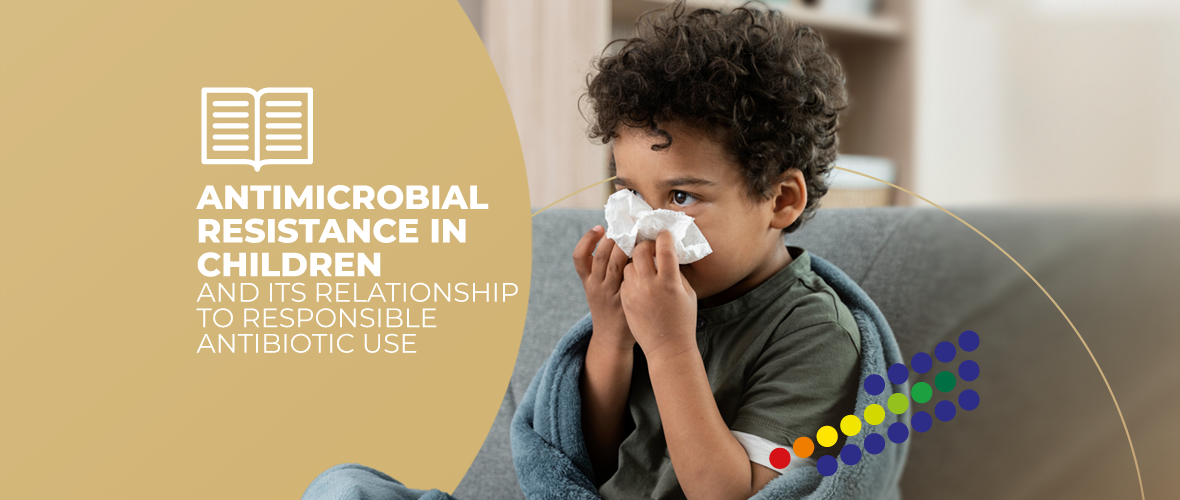ANTIMICROBIAL RESISTANCE IN CHILDREN AND ITS RELATIONSHIP TO RESPONSIBLE ANTIBIOTIC USE

Antimicrobial resistance (AMR) is a worrying global challenge to public health and the effectiveness of medical treatments. This issue involves the ability of microorganisms, such as bacteria, viruses, fungi and parasites, to resist the effects of antimicrobial drugs, including antibiotics, antivirals and antifungals. As these microorganisms evolve and acquire resistance, the effectiveness of treatments is reduced, putting health at risk. Meeting this challenge requires the responsible use of antibiotics, adhering to the guidelines and recommendations issued by the World Health Organization (WHO) and other health entities.
Antibiotics are very effective drugs that, during the last decades, have contributed greatly to the reduction of infant mortality. However, they should not be used indiscriminately without knowing what type of infection or bacteria to treat.
Their activity has spread to most pathogenic bacteria in children and their potency has increased considerably, while their side effects have been reduced, but excessive consumption causes bacteria to become increasingly accustomed to them and become resistant, leading to major problems in the treatment of some common diseases.
This can be avoided by being very careful in their use. Antibiotics are not necessary in infectious diseases, as they are ineffective against viruses, which are the organisms that cause 80% of infections in children.
The misuse and inappropriate use of antibiotics have been shown to be key factors in the development and spread of antimicrobial resistance. When antibiotics are used incorrectly, such as in inadequate doses or for too short a period of time, or when they are used to treat viral infections that do not respond to antibiotics, microorganisms can survive and generate resistance.
Drug-resistant infections become more complicated to treat and can lead to more severe disease, increased mortality rates and higher costs to the health care system.
Adopting a responsible attitude in the use of antibiotics in your little ones is essential to combat antimicrobial resistance and to preserve the efficacy of these drugs. WHO and other health institutions have focused their efforts on educating medical professionals, patients and the general public about the importance of using antibiotics appropriately and only when necessary. Some key measures include:
- Appropriate Use: Antibiotics should be used only under the prescription of qualified health professionals and to treat bacterial infections. They are not effective against viral infections, such as the common cold or flu.
- Full Duration of Treatment: Completing the full course of antibiotic treatment, even if symptoms improve earlier, is essential. Discontinuing treatment prematurely may allow resistant bacteria to survive and multiply.
- Correct dosage: Taking the correct dosage at the established intervals guarantees the effectiveness of the treatment and reduces the possibility of developing resistance.
- Avoid Sharing and Self-Medication: Antibiotics should not be shared with others and it is crucial to avoid self-medication with antibiotics without the supervision of a health care professional.
The overuse of antibiotics can have an impact on the immune system due to their effect on the intestinal microbiota, or gut flora. The intestinal microbiota is a diverse community of microorganisms, including beneficial bacteria, that inhabit the gastrointestinal tract and play a crucial role in human health, including immune function.
When antibiotics are used excessively, these drugs can kill not only the pathogenic bacteria that are causing an infection, but also the beneficial bacteria that make up the gut microbiota. This can lead to an imbalance in the microbiota, known as dysbiosis. Dysbiosis can affect immune function in several ways:
Decreased bacterial diversity: A healthy microbiota is diverse and balanced. A decrease in this diversity can negatively affect the regulation of the immune system.
Increased susceptibility to infections: The gut microbiota plays an important role in defending against invasions by pathogenic microorganisms. Dysbiosis can make the body more susceptible to infections, as beneficial bacteria compete with pathogens for space and nutrients.
Altered immune regulation: The microbiota influences the regulation of the immune system, helping to prevent excessive or inappropriate immune responses. Dysbiosis can lead to imbalanced immune responses, which can increase the risk of allergies, autoimmune diseases and other immune disorders.
Inflammation: Dysbiosis can contribute to chronic low-grade inflammation in the body. Chronic inflammation is linked to a variety of diseases, including autoimmune diseases, cardiovascular diseases and metabolic disorders.
It is important to remember that antibiotics are essential tools to treat bacterial infections and save lives, but their use should be appropriate and prudent to avoid the development of bacterial resistance and negative effects on intestinal microbiota and immune health. It is always advisable to follow medical indications and avoid self-medicating children with antibiotics. In cases of mild or viral infections that do not require antibiotics, it is essential to allow the immune system to function naturally to fight the infection or to help improve its functioning with natural products.
To address this issue, it is crucial to educate parents about the proper use of antibiotics, the importance of completing prescribed treatments and the prevention of infections through effective hygiene measures. Bacterial resistance is a problem that affects all ages, but its impact on children is especially critical due to their vulnerability and the long-term consequences for their health and well-being.


